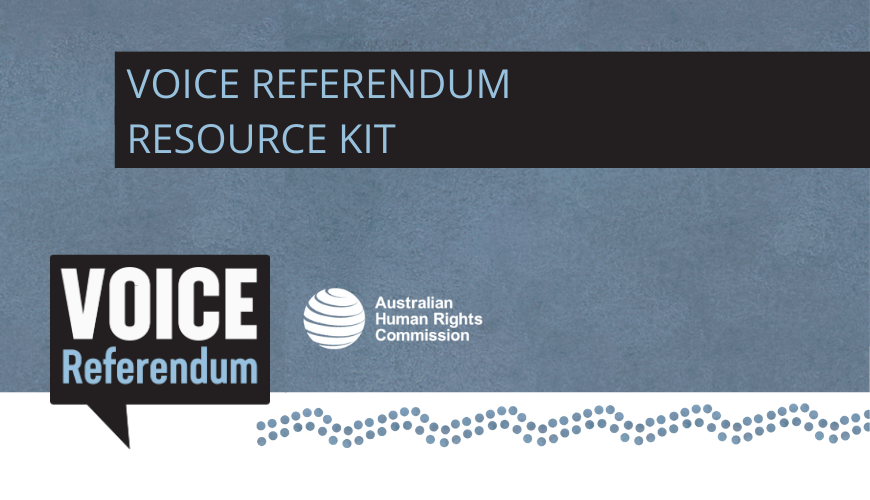Voice Referendum: Understanding the referendum from a human rights perspective

The Commission has produced an educational resource kit to encourage the Australian public to consider the Uluru Statement from the Heart and the Indigenous Voice to Parliament referendum through a human rights lens.
Conversations about the referendum and proposed Voice to Parliament have the potential to be harmful for First Nations peoples. The Commission’s Voice referendum resources seek to minimise harm by encouraging cultural humility and focusing the conversation on human rights principles as they relate to the referendum and proposed Voice to Parliament.
There are nine documents in the resource kit – available to download in full:
They are available for individual download on the webpages linked below:
- The Uluru Statement from the Heart
- Minimising harm in conversations about the referendum
- Indigenous Rights & the Voice
- The history of Aboriginal and Torres Strait Islander peoples advocating for the right to be heard
- Symbolic change or substantive reform
- Self-determination and Indigenous peoples
- The Voice and human rights
- Referendums and constitutional change
- Support services
About the Australian Human Rights Commission
The Australian Human Rights Commission (Commission) is an independent organisation, established by an Act of the Australian Parliament. The Commission is responsible for promoting awareness of human rights, educating the Australian community about such rights, and providing expert guidance on Australia’s human rights obligations, both internationally and domestically.
The Commission has a long history of advocating for the full realisation of Indigenous rights, as defined by the United Nations Declaration on the Rights of Indigenous Peoples (UNDRIP).
The Commission’s contribution to the 2023 referendum is independent and non-partisan, appropriate to its role as a National Human Rights Institution (NHRI).
The Commission thanks IndigenousX, a 100% Indigenous owned and operated media, consultancy and training organisation, for their generous guidance and expertise on this project until mid-June 2023. The Commission was grateful for the opportunity to partner with IndigenousX due to their impartial and non-partisan position on the upcoming referendum and demonstrated understanding of the Commission’s independent and statutory role. Further, IndigenousX's insights into the nature of race and racism in Australia along with their dedication to ensuring careful consideration of and respect for Indigenous rights, knowledges, and experiences, proved invaluable to the development of these resources.
The Commission also thanks Saltwater People, an Indigenous-owned, full-service creative agency that delivers strategic design communications and cross-cultural engagement. Throughout the development of this resource kit, they generously provided expertise in best practice cross-cultural engagement, Indigenous Cultural and Intellectual Property (ICIP) and visual communication.
Please note, the artwork accompanying this kit is © Paul Bong.
Terminology
Please note, the Commission uses the terms: Aboriginal and Torres Strait Islander people/s, First Nations people/s, Indigenous people/s, and Traditional Owners interchangeably throughout the resource kit, acknowledging that individuals and communities self-identify using a variety of terms.
The word ‘peoples’ recognises that Aboriginal and Torres Strait Islander peoples have both a collective and individual dimension to their lives, as affirmed by the United Nations Declaration on the Rights of Indigenous Peoples.
In using these terms, we do not intend to simplify, reduce or imply homogeneity among the hundreds of distinct Nations, languages and cultures that make up the lands now known as 'Australia'.
